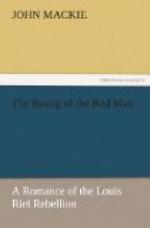“Child-of-Light has spoken fairly,” he said, “but it remains to be shown how much of what he has said is true, and how much like the ghost-waters that deceive the traveller in autumn, in places where nought but the sage-bush grows, and the ground is parched and dry. Douglas and the others must come with us. We shall return to the strong lodges in the Eagle Hills and await what time may bring. If the warriors of the Great Queen come to the land and molest us, then shall you all be put to death. But if they come and stay their hand, then we shall let you return to your own homes. As for the white maiden, the daughter of Douglas, nothing that belongs to her shall be touched, and she shall have a squaw to wait upon her. I have spoken.”
He was a far-seeing redskin, and meditated grim reprisals when the time was ripe.
In a few days, when the snow had completely gone, they started back to the Eagle Hills. It was heavy travelling, and the men had to walk, but the Indians got a light Red River cart for Dorothy, and in this, attended by a squaw, she made the greater part of the journey. Their goods were not interfered with, for the Indians had a plethora of loot from the Battleford stores. But still the uncertainty of their ultimate fate was ever hanging over them. They knew that if Poundmaker thought the British were not coming, or that they were not strong enough to vanquish him, he was capable of any devilry.
They passed into the wild, broken country of the Eagle Hills, the “Bad Lands,” as they were called, and there, in a great grassy hollow surrounded by precipices, gullies, and terraces of wonderfully-coloured clays, they camped.
It was now the end of April, and the prisoners were beginning to get uneasy. Had anything happened to the British, or had they been left to their fate? The situation was more critical than they cared to admit But one day all was bustle in the camp, and the warriors stood to their arms.
The British column had moved out from Battleford, and was advancing to give battle to Poundmaker.
The critical moment had come.
CHAPTER XX
THE BATTLE OF CUT-KNIFE
When the Indians discovered that bright May morning that a British column had unexpectedly moved right up to their position, there was a scene approaching confusion for a few minutes. But they had studied the ground for days and knew every inch of it, so that each individual had his allotted post, and needed no orders to go there. Luckily for the prisoners, however, Poundmaker had not time to put into operation the elaborate plans he had contemplated. Moreover, the chief saw, to his no little consternation, that, as Child-of-Light had said, the soldiers of the White Queen were in numbers beyond anything he had expected. He therefore hurried the prisoners up a narrow terrace to a high headland from which it would be impossible




